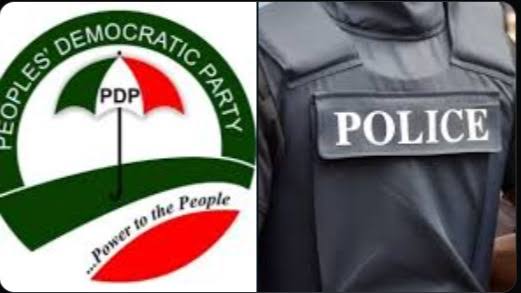Tensions Mount as Leadership Crisis Rocks Nigeria’s Main Opposition Party
By HeadlineNews.News Political Desk
Abuja | June 29, 2025
Nigeria’s main opposition party, the People’s Democratic Party (PDP), descended further into internal chaos today as security forces sealed off the PDP National Secretariat (Wadata Plaza) in Abuja, just hours before the party’s much-anticipated National Executive Committee (NEC) meeting was scheduled to take place.
The Nigeria Police Force, supported by operatives from the Department of State Services (DSS), cordoned off the area early Saturday morning, citing “intelligence reports indicating possible breakdown of law and order” as the reason for their intervention.

A Party in Crisis: What’s Fueling the Tension?
Sources within the PDP told HeadlineNews.News that the NEC meeting was expected to address key leadership disputes, including:
The controversial status of Ambassador Umar Damagum, who has been serving as acting National Chairman since the suspension of Iyorchia Ayu in 2023.
Alleged moves by power blocs within the party—particularly from the South-South and North-West caucuses—to demand a reshuffling of the National Working Committee (NWC).
Tensions over the party’s direction ahead of the 2027 general elections, including debates over alliances with smaller opposition parties.
Police action today may have been preemptive—but it underscores the volatility brewing inside the PDP, a party still struggling to regain its footing since losing power at the federal level in 2015.
Historical Flashback: PDP and Power Struggles
Since its formation in 1998, the PDP was Nigeria’s dominant party for 16 uninterrupted years, producing Presidents Olusegun Obasanjo, Umaru Musa Yar’Adua, and Goodluck Jonathan. But following its shocking defeat to the APC in 2015, the party has faced:
- Four national chairmanship crises (Ali Modu Sheriff, Makarfi vs Sheriff legal battles, Secondus ouster, Ayu’s suspension)
- Numerous defections, including sitting governors, senators, and state assembly members
- An inability to consistently present a united front in presidential contests, as seen in the 2023 elections
Today’s police action is a reflection of this chronic instability.
Implications for 2027 and National Politics
Analysts say the timing of the security intervention could also be linked to broader realignments within the political landscape:
PDP’s internal warlords are reportedly divided on whether to forge a merger or coalition with Peter Obi’s Labour Party, or reposition the party independently for 2027.
Some Northern elements within the party are allegedly opposed to a Southern presidential ticket, a fault line that also affected the party in 2023.
There are speculations that external influences—possibly from rival political camps—may be stoking internal divisions to weaken the opposition ahead of national elections.

“If the PDP fails to organize and restructure now, it risks irrelevance in 2027,” said Dr. Ibrahim Galadima, a political science lecturer at the University of Abuja. “Today’s police blockade is both a symptom and a warning sign.”
PDP Reacts
In a swift reaction, the PDP National Publicity Secretary described the police action as “unconstitutional, provocative, and aimed at stifling democratic engagement.”
Party leaders insist that the NEC meeting will be rescheduled or moved to a neutral venue.
The FCT Police Command, however, maintains that its action was “preventive,” not political.
Conclusion: A Party at a Crossroads
With its headquarters sealed and its leadership still in dispute, the PDP finds itself once again on the edge of implosion. Whether the party can overcome these latest hurdles, or slide further into fragmentation, will largely determine its future role in Nigeria’s evolving democratic contest.
For now, 2027 may be far, but for the PDP, the battle for survival has already begun.
© 2025 HeadlineNews.News
For follow-ups, analysis, or inside party reports, email: politicaldesk@headlinenews.news



